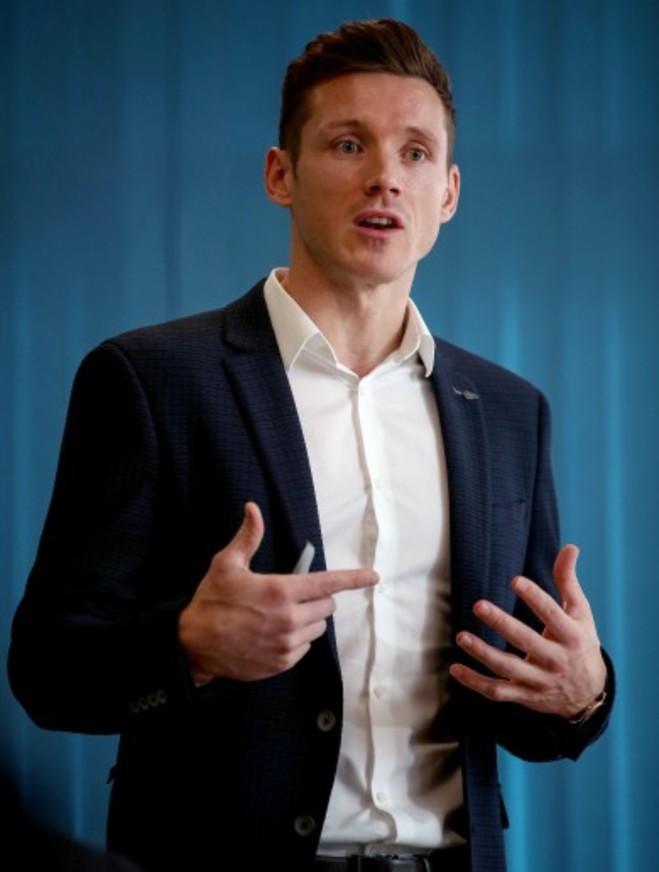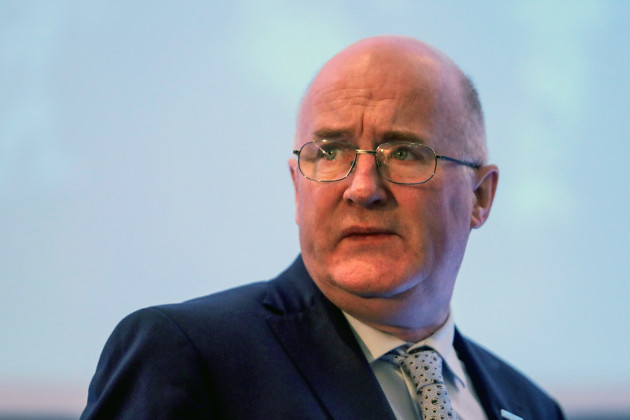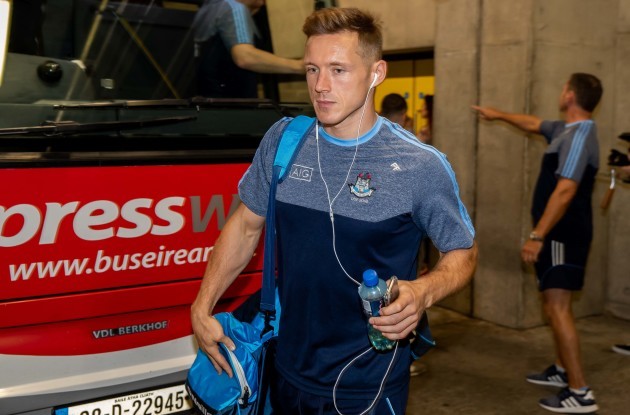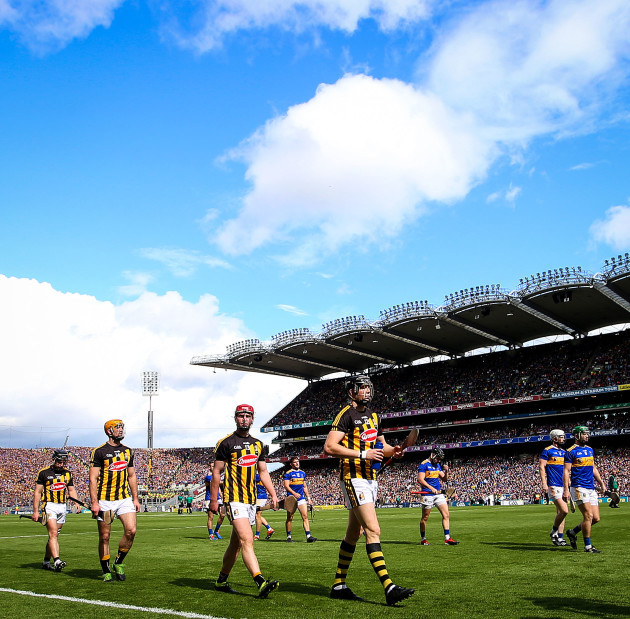PAUL FLYNN HAS spoken of his frustration at the GAA pressing ahead with their plans for a vote on the introduction of a Tier 2 football championship at Special Congress on 19 October.
The proposal involves Divison 3 and 4 teams competing in a second-tier championship following their provincial exits unless they reach the final.
Last Friday, the Gaelic Players Association released a statement calling for the proposal to be shelved until after the GAA’s Fixtures Task Force issues its report.
On Monday, the GAA revealed that the proposal would go ahead in front of delegates at next month’s Special Congress in Cork.
When it was put to him that during the summer the GPA announced that 60% of its membership voted in favour of a two-tier structure, Flynn responded: “I’ll clarify that. There’s an appetite for a Tier 2 structure. Not this one.”
The GPA CEO has been publically calling for the GAA to slow down the rush to push through a two-tier championship since July.
“We’ve been on about this for months with them,” he said at the launch of the GPA’s 2018 annual report yesterday.
I did an op-ed piece three months ago. We’ve had engagements with the GAA. We’ve had players in meeting with the GAA. We’ve had Feargal McGill on calls with key stakeholders from the 16 counties representing their squads.
“It’s been ongoing. It’s a difficult area to crack down because there’s different interests, even within the squads that we have. When we had seen that the Fixtures Task Force was put together, which I have to say are an excellent group that are coming up with really interesting findings already, none of it has been publicly out there. Part of it is structural reform.
“Part of it is having longer-term views, medium terms views and short term views of what it could look like. It will benefit players, club and county, college, schools, the whole lot. It’s a very difficult area. We all know. If it was easy, it would be fixed by now.
But equally, that group are giving a good stab at putting some really strong recommendations together, that I feel we should be investing in, that we feel, the GPA – not just me, feel that we should be investing in that group rather than bringing in a Tier 2 structure that the players do not support this structure.”
The fixtures task force are due to deliver their recommendations in November and for Flynn, it makes sense to hold off any decisions until after that report.
“It could have been a case of just waiting a couple of months and just going to normal Congress, rather than having the Special Congress,” he said.
“Tier 2 can be something that’s really positive. All we’re trying to do is that you get the right people deciding it, defining it, and delivering it. And then we’ll get a good outcome.”
He stressed that the GPA and players would be far more likely to support a Tier 2 competition if it came as part of an overall structural change to the calendar.
GAA President John Horan has been keen to force it through since he came into office, with some suggesting that he wants to make the introduction of Tier 2 the legacy of his presidency.
“I think the bigger legacy for anybody in the GAA would be to have an overall structure review of the overall year – club and county,” responded Flynn. “That’s something that everybody would be remembered for.”
Over the next fortnight, the GPA will poll its players on the three proposed playing rule changes which will also go in front of the Special Congress.
Flynn admits there was a “massive negative swell” from squads against the handpass rule which was trialled this year, but it’s believed players are much more positive about the three proposed changes bring brought forward to a vote.
The rule changes involve taking kick-outs from the 20m line, the introduction of a ‘sin bin’ for black cards and the offensive mark. Around 70 player reps will be polled on the rule changes at the GPA’s AGM which takes place later today in Dunboyne Castle.
The meeting will be “all-encompassing” according to Flynn. Members will also review the season, discuss the Tier 2 proposals and take a vote on the GPA’s proposed four motions:
- Introduction of centralised expenses online system
- Review concussion management protocols
- Lobby for the establishment of a group to review competitive balance within the GAA
- Formalise WGPA partnership
(More information on the four motions here)
Speaking about the motion surrounding a competitive balance, Flynn explained that the AFL influenced their thinking on the matter.
“It’s more (from) players. No collective squad came to us. Over the course of the year, we’ve had a number of players coming to us, whether it be hurling squads or football squads, that maybe are giving out about the championship structures, maybe giving out about their funding, how they’re supported, it’s an eclectic mix of reasons.
“We took them all on board. I’ve ongoing discussions with Paul Marsh, my role equivalent in the AFL. He had spoken to me about it. They rolled it out in 2015. They’re going through it still, this equalisation strategy.”
The stated aim of the AFL’s competitive balance policy is ‘Working to ensure any team can win on any given day’.
“They had 18 clubs that took 18 months to come up with policy,” he explained
Its measures include a salary cap, luxury tax and higher draft picks for lower-ranked teams, which Flynn knows won’t all apply in the GAA.
“I think there’s a lot to learn from it,” he continued. “There’s a lot different in it, from what we could do. Things that could come into it are budget control for squads, championship structures whereby people feel they have a championship structure they feel that they can win.
So as I say, it’s multifaceted. The terms of reference will be defined. But what we’re asking the AGM is for them to support us in lobbying the GAA to look at this area.”
When introducing the concussion motion, Flynn revealed he was concussed five times during his Dublin career. He said the GPA’s Player Safety and Welfare Committee are concerned at how concussion management guidelines are being implemented which puts players at greater risk.
The GPA can bring one motion to Congress each year and the Fingallians man sees the concussion motion as the most likely to be put forward by the players’ body next February.
The GPA’s three-year funding arrangement with the GAA runs out in October and both organisations are currently in talks over a new deal. The GPA signed a groundbreaking €6.2m-per-year deal for 2017-19 and while Flynn confirmed discussions are ongoing, he was reluctant to go into much detail.
“I suppose we’re going to have more time now the season is finished to really get into it,” he said. “These things take time.
“When I came into this role one of the key things for me is not talking about the GPA about funding in the newspapers, let’s talk about the players because that’s what we are. We’re a representative body for the players.”
Finally, he clarified his comments from last month where he said the GPA hadn’t ruled out going after gate receipts as part of their funding from the GAA.
“The thing about that was it was taken out of context,” said the former Dublin forward.
“I’m not going to get caught into that trap again. If you go back to the overall theme, it’s about the player and supporting the player. What I said on that was, once we can support the player, where exactly it comes from from a GAA perspective we’re agnostic to that.
“So that’s what I said back then and that remains. It’s really about the support of the player, support the programmes because it’s not just about funding for the GPA to run programmes.
“It also brings into account expenses and the funding for players which are significant expenses. When these guys have 31 hours invested into their inter-county career, they can’t have part-time jobs.
“There’s some fallacy out there that inter-county players are living the high life, it couldn’t be further from the truth. A lot of these guys are on the breadline, in many ways they’re on the breadline.
“And not just the students, guys are forgoing opportunities for promotions in jobs because they can’t travel or they have to leave work at 4pm in the day to travel down the country.
“It disappoints me when I read about the fact that inter-county players have the high life, it couldn’t be further from the truth. There’s not only time constraints on players but there’s also serious financial constraints and not just on them, on their families as well.”
The42 is on Instagram! Tap the button below on your phone to follow us!




